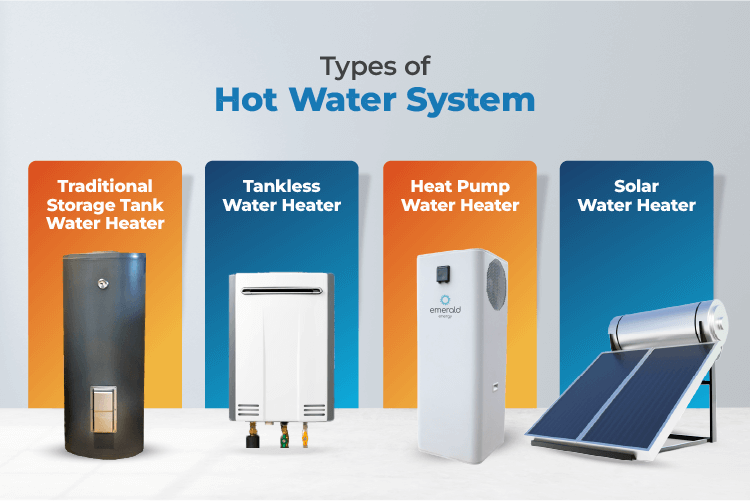As the backbone of your household's comfort, your hot water system plays a crucial role in daily activities, from showers to washing dishes.
When it starts to fail, the signs can range from lukewarm water to outright leaks, signaling that it's time for a hot water system replacement. Here's a comprehensive guide to help you navigate the process and ensure you make the best choice for your home.
Signs You Need a New Hot Water System
Understanding when to replace your hot water system is key to avoiding unexpected breakdowns. Common indicators include:
- Inconsistent Water Temperature: If your water is no longer consistently hot, it could mean your system is struggling to function efficiently.
- Leaks and Rust: Visible leaks around the unit or rusty water coming from your taps are clear signs that you need a hot water tank replacement.
- Age of the System: Most hot water units have a lifespan of about 10-15 years. If your system is nearing this age, it's wise to start considering replace hot water system before it fails completely.
Future-Proofing Your Home with a Hot Water Setup Replacement
Investing in a hot water unit replacement is not just about addressing immediate needs but also about future-proofing your home.
As technology evolves, newer hot water units offer advanced features and greater energy efficiency, which can significantly reduce your utility bills and environmental footprint.
Moreover, a timely hot water unit replacement ensures you avoid the inconvenience of sudden breakdowns and costly repairs. By choosing a modern, efficient system, you’re making a smart investment that enhances the comfort and sustainability of your home for years to come.
Types of Hot Water Systems
When it comes to hot water system replacement, you have several options to consider:

- Traditional Storage Tank Water Heaters: These are the most common and store a large amount of heated water. They are reliable but can be less energy-efficient.
- Tankless Water Heaters: These provide hot water on demand without storing it, which can save energy and space. However, they might require a higher upfront investment.
- Heat Pump Water Heaters: These systems are highly efficient, using electricity to move heat from the air to heat water, making them a sustainable option.
- Solar Water Heaters: Utilizing solar panels, these systems are eco-friendly and can significantly reduce energy bills, though they depend on the amount of sunlight your area receives.
Steps to Replace Your Hot Water System

1. Assess Your Needs
Consider the size of your household and your daily hot water usage. Larger families may benefit from a traditional tank system, while smaller households might find tankless systems more efficient.
2. Research and Select a System
Based on your needs, research the different types of systems available. Pay attention to energy efficiency ratings and potential long-term savings.
3. Find a Qualified Installer
Choose a reputable installer with experience in hot water system replacement. A professional can ensure that the installation is done correctly and safely.
4. Take Advantage of Rebates and Incentives
Check for any available rebates or incentives for upgrading to more energy-efficient systems. Many regions offer financial incentives for eco-friendly home improvements.
Benefits of Upgrading Your Hot Water System
Energy Efficiency and Cost Savings
Newer models of hot water systems are designed to be more energy-efficient, which can lead to significant savings on your utility bills. Upgrading to a more efficient system not only reduces your environmental footprint but also lowers your monthly expenses.
Improved Performance and Reliability
A replace hot water system ensures reliable performance and consistent water temperatures. You'll no longer have to worry about sudden cold showers or long waits for hot water.
Advanced Features
Modern hot water systems come with advanced features like Wi-Fi connectivity, allowing you to monitor and control your water heater remotely. These features can help you optimize energy use and improve convenience.
Maintenance Tips for Longevity
To extend the life of You'llew hot water system, regular maintenance is essential. Schedule annual inspections with a professional to check for any potential issues and ensure the system is operating efficiently.
1. Flushing the Tank
For traditional tank systems, periodically flushing the tank helps remove sediment buildup, which can improve efficiency and prevent damage.
2. Monitoring and Adjusting Settings
Keep an eye on your system's settings. For instance, setting the thermostat to 120 degrees Fahrenheit can save energy and prevent scalding.

Conclusion
When it comes to replacing your hot water system, being proactive and informed can save you from unexpected breakdowns and ensure you choose the best system for your needs. Whether you're looking at a hot water tank replacement or considering the latest in heat pump technology, the time to research and plan your hot water system replacement can lead to greater efficiency, cost savings, and improved comfort in your home.






